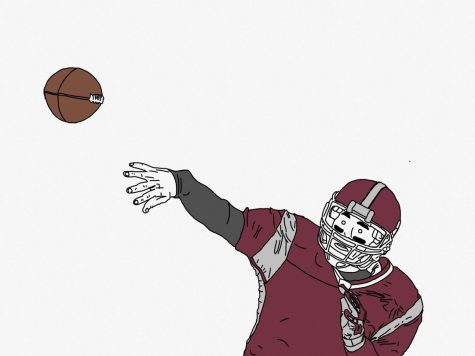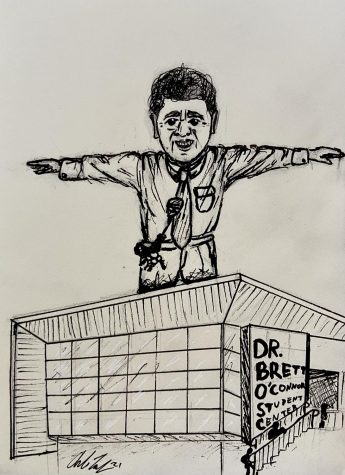Part 2 of 2: We must extricate the world from the grips of unethical, antidemocratic capitalism
[Continued from Part 1:] Deforestation and other similar global activities, accelerants of climate change and ecosystem-destroyers, are unquestionably morally perverse. Such activities, if their effects are not reversed, will decimate the environment, causing unquantifiable human suffering and the collapse of society.
So, with the future in mind, why do corporations and their employees make immoral choices to slash and burn forests? Deforestation is economically motivated, but studies show that, disregarding environmental impact, even its presumed economic benefits are short-term. These short-term economic benefits may be sought due to national debt, the desirability of timber products, and the allure of cultivating additional agricultural land. In short, the structure of world commerce encourages deforestation in poorer regions, despite its short-term fiscal and negative ethical values, because members of the system, concerned primarily with their own welfare, are forced to play by its rules which prioritized quarter-over-quarter growth in shareholder wealth over all else.
To encourage sustainable action, the system must be altered, because simple education on the immorality of deforestation would not blind the private sector to perceived economic gains. An alteration of the system could constitute the assignment of a monetary value to factors which are neglected in today’s economic and political decision-making processes. These neglected factors, according to the article, “The Economics of Tropical Deforestation,” include “ecological functions [or benefits of a healthy ecosystem to the surrounding society; for instance,] … energy flow and microclimatic regulation; indirect values [or traits of a healthy forest or ecosystem which promote fiscal growth in areas] such as recreation and tourism in forest areas.” The suggestions given by Barbier and others (the authors) about potential monetary values which could be assigned to elements of nature such as forests may seem far-fetched and complex, and “the option value of the future use of forest resources … and existence value derived from the desire of people to pay for the very existence of these resources” are no exception. Such a solution which works within the bounds of the current system yet incentivizes people and corporations to act ethically by way of monetary values would indeed be difficult to manage. Why not sidestep the complications of monetizing each and every ramification of every action by opting to introduce a more ethics-driven system?
Peter Söderbaum and two other scholars ask the world a similar question in providing a new political economic framework, one of “positional analysis,” as they call it. Söderbaum and others offer a counter argument to Barbier and others’ propositions: an assignment of a quantitative price or payoff to qualities of land and goods constitutes both monetary and ideological reductionism in that: First, a choice is analyzed one-dimensionally through cost-benefit analysis, which reduces the complexity of an action to a single monetary impact. An analogy to the hit Netflix series “The Good Place” can be used to explain this one-dimensionality of tools offered by the current capitalist system in that — just as a superficial, cost-benefit analysis of a political-economic action sums to one number, eschewing the plurality of an action’s impacts — in “The Good Place,” the moral value of a person’s life is represented in one number, the sum of arbitrary point values assigned to everything they have done in life, where a positive value represents a “good” person and a negative one represents a “bad” person. Just as it is problematic to represent multidimensional people with a single number, it is also problematic to reduce an action in the world to a single cost or benefit. For that reason, Söderbaum proposes the use of multi-dimensional impact profiles (explained in greater detail below) in making a political-economic decision.
The second flaw cited by Söderbaum and others of cost-benefit analysis is that the current system is undemocratically reductionistic in its ideology in that it “can be described as a ‘technocratic’ approach where the analyst as an expert is believed to be equipped with the capability to determine what is ‘best’ for society as a whole,” Söderbaum writes. For instance, Harris points to the flaws in the current system which allows a room containing mostly 30-year-old, white, Silicon-Valley men to decide how and to what end huge social media platforms influence the behaviour of their users. In this example and others, the “analyst” governs the decisions of powerful bodies for which they work, in turn determining “what is ‘best’ for society.” An interdisciplinary vision for a sustainable, democratic future, positional analysis is a promising theoretical framework which approaches politics and economics multidimensional.
The foundational notions of positional analysis as a framework for economics are, Söderbaum writes: “Markets in terms of supply and demand … are instead understood as relationships and networks between PEPs [political economic people, or members of society] and PEOs [political economic organizations, or what are known as corporations in our current framework],” and when making a choice within the new framework, one uses “positional analysis” rather than “neoclassical cost-benefit analysis.” In the framework of today’s economics, the quantitative goal is to maximize profits for shareholders. However, in positional analysis, “decision-making is a matter of a ‘matching’ process between the ideological orientation of an actor as decision-maker and the expected multidimensional ‘impact profile’ of each alternative of choice considered,” an impact profile which includes a map of impacts using “decision-trees” and considering qualitative impacts such as irreversibility. Söderbaum also proposes that rather than thinking of markets in terms of supply and demand, they are understood in positional analysis “as relationships and networks between” individuals and organizations. Now, these ideas may seem extremely complex, and while they are packed densely into few sentences, they are simply a strategy which furthers democracy and the ethics of societal decision making.
Consider a situation — however silly it may seem — where children are deciding on a game to play (i.e. whether to play tag, soccer, etc.). Now, in the status quo, a bully may dominate the conversation, seeking only to increase what they see as their “popularity” through their choice of game. Perhaps because they and a few other children practice gymnastics, the group decides to play on the monkey bars to cater to their skill sets and improve upon their gymnastics skills. They do not, however, consider the ineptitude of other classmates on the monkey bars, and many in the group of children do not enjoy the game, while one child breaks their arm. Now, the short-term, selfish motives of the bully group negatively affected members of the playground group. In a world of positional analysis, on the other hand, the group might choose a safer game which more people enjoy, or they might choose to match the mindset of the “bully” group with another group. Perhaps the group creates a diagram of the possible consequences of choosing each game (impact profiles, to use Söderbaum’s terminology), and because no game fits the entire group perfectly, the group splinters briefly. Perhaps the “bully’s” need for attention is satisfied because one child chooses to read on a bench near the monkey bars, commenting on the “bully’s” gymnastic skill and confidence on the play structure. In such a case, the goal of the reading child (to read, learn, and observe the world perhaps) is matched with that of the gymnast child (to receive attention and praise, or to practice navigating the monkey bars). In this ideal world of positional analysis, the gymnast child is no longer a “bully;” no one breaks their arm; everyone is content with the outcome of the situation with respect to their personal “ideological orientation;” and one of Harris’ broad steps to humane technology is fulfilled: the “goals of the persuader” are aligned with those of the “persuadee.”
The scholars who propose positional analysis define economics under a system using positional analysis as “‘multidimensional management of limited resources in a democratic society’” so that qualitative impacts are included in the formation of conclusions and so that “conclusions will be conditional in relation to each ideological orientation considered.” Although all of this framework seems extremely theoretical and complex, its very complexity makes it a foundation for the furthering of democracy, sustainability, and social justice. Carefully considering the potential impacts of each action in society and their relation to individual actors’ worldviews makes for an ethical and democratic society.
The shortcomings of the world’s current economic system have been notable for Americans during the COVID-19 pandemic. In the eleven months since March, many Americans have been convinced by the country’s economic structure to cast away human life in order to “save the economy,” meaning to safeguard the positive trends of stocks while disregarding unemployment rates and resultant widespread economic hardship. The analysis of this situation is clear: short-term economic gains for wealthy corporations should not be prioritized over human life.
If the world sought justice and sustainability within today’s structure of “neoclassical cost-benefit analysis,” a monetary value would have to be assigned to irreversible deforestation and to potential loss of life to COVID-19. Yet, evaluating lives and the health of the Earth from a quantitative standpoint is tantamount to asking a parent to put a price tag on their child, or at least it should be. Positional analysis is a far more powerful, logical, and long-term approach to political economics and would allow the world to seek equity and environmentally sound practices in a democratic and effective manner.
A system respecting environmental justice and human life would also respect human time and facilitate the transition from the current framework of the internet to one which allows the political economic person more free will, one which eliminates manipulation of people’s ideas and time by “neoclassical profit maximizing-firms,” and thus a framework which upholds democratic principles and aids in the dissemination of the truth.
Although changes to ingrained ways of thinking and conducting business are difficult to implement, paradigm shifts to our current capitalist road to hell should be seen as ethical and logical imperatives, which may not, and should not, be achieved overnight. These shifts should be achieved, however, in the shortest possible timeframe which maximizes long-term stability and prosperity.
It is also worth noting that these changes may seem somewhat hyper optimistic or unrealistic. Yet, considering the immense influence of parties involved and dire state of affairs which will only worsen with the continual existence of this system, it is feasible and must be done. Already, society witnesses the havoc caused by the current political economic framework: loss of ecosystems and biodiversity, increasing divides between the rich and poor, unethical business practices which harm society and its members, the willingness of factions to fight for their fundamentally fabricated or corrupt worldviews, and more. This havoc will only worsen in the future, furthering the devastating results of capitalism. Down the road, I want to live in a more just, secure, and healthy world, not on an Earth marred by climate change, wars, and inequity. Don’t you?
Hello there! Our goal is to provide relavent, engaging journalism for readers of all ages. Your donation will support the student journalists of the Wolfpacket at Claremont High School, and will allow us to purchase equipment, print our monthly issues, and enter in journalism competitions. We appreciate your consideration!

A senior in his third year on the Wolfpacket staff, Rowan Orlijan-Rhyne, occasionally referred to as Rowan “Orange Rind” by his Wolfpacket peers, strives...




